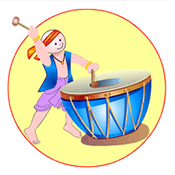
Dimdima
Online Children's Magazine from India

Dimdima
Online Children's Magazine from India
| The Himalayan Blunder |
|
|
Gandhiji's decision to call off the non-cooperation movement came as a great
disappointment to the people. "No one could understand," wrote Subhas Chandra
Bose, "why the Mahatma should have used the isolated incident at Chauri Chaura
for strangling the movement all over the country. To sound the order of retreat
just when public enthusiasm was reaching the boiling point was nothing short of
a national calamity." Gandhiji had informed the Viceroy before launching the
civil disobedience campaign so when he called it off the British were jubilant.
"Let the opponent glory in our humiliation or so called defeat", said Gandhiji
with his characteristic calmness. "It is better to be charged with cowardice and
weakness than to be guilty of denial of our oath and to sin against God. It is a
million times better to appear untrue before the world than to be untrue to
ourselves". Explaining Gandhiji's strange behaviour his biographer Louis Fischer
wrote: "Gandhijis criteria were not the usual criteria of politics. His
leadership did not depend on victories. He did not have to save face. He could
admit blunders Himalayan or less, because he did not claim infallibility or
superiority."
Viceroy Reading thought that Gandhi was finished as a politician. Gandhi, he
wrote, "had pretty well run himself into the last ditch as a politician..."And
the Viceroy chose that moment to strike. Gandhi was arrested on the charge of
sedition.
Gandhiji told judge Bromfield. "I do not ask for mercy... I am here, therefore
to invite and cheerfully submit to the highest penalty that can be inflicted
upon me for what in law is a deliberate crime and what appears to me to be the
highest duty of a citizen... In my opinion, non co-operation with evil is as
much a duty as is co-operation with good."
The judge bowed to Gandhiji and before sentencing him to six years imprisonment
said: "...It would be impossible to ignore the fact that, in the eyes of
millions of your countrymen, you are a great patriot and a great leader. Even
those who differ from you in politics look upon you as a man of high ideals…"
Writing in 'Young India' Gandhiji had said: "Rivers of blood shed by the
Government cannot frighten me, but I should be deeply pained even if the people
did so much as abuse the government for my sake or in my name. It would be
disgracing me if the people lost their equilibrium on my arrest."
His countrymen fulfilled his expectations. There was no disorder. People waited
patiently for the return of the Mahatma now languishing in jail.
Dimdima is the Sanskrit word for ‘drumbeat’. In olden days, victory in battle was heralded by the beat of drums or any important news to be conveyed to the people used to be accompanied with drumbeats.
Bharatiya Vidya Bhavan
K. M Munshi Marg,
Chowpatty, Mumbai - 400 007
email : editor@dimdima.com
Bharatiya Vidya Bhavan
505, Sane Guruji Marg,
Tardeo, Mumbai - 400 034
email : promo@dimdima.com
Dimdima.com, the Children's Website of Bharatiya Vidya Bhavan launched in 2000 and came out with a Printed version of Dimdima Magazine in 2004. At present the Printed Version have more than 35,000 subscribers from India and Abroad.